The Nicotine-Patch Highs to The Reichenbach Lows – Ranking Every Episode of BBC’s 'Sherlock'
“The game, Mrs. Hudson, is on!”
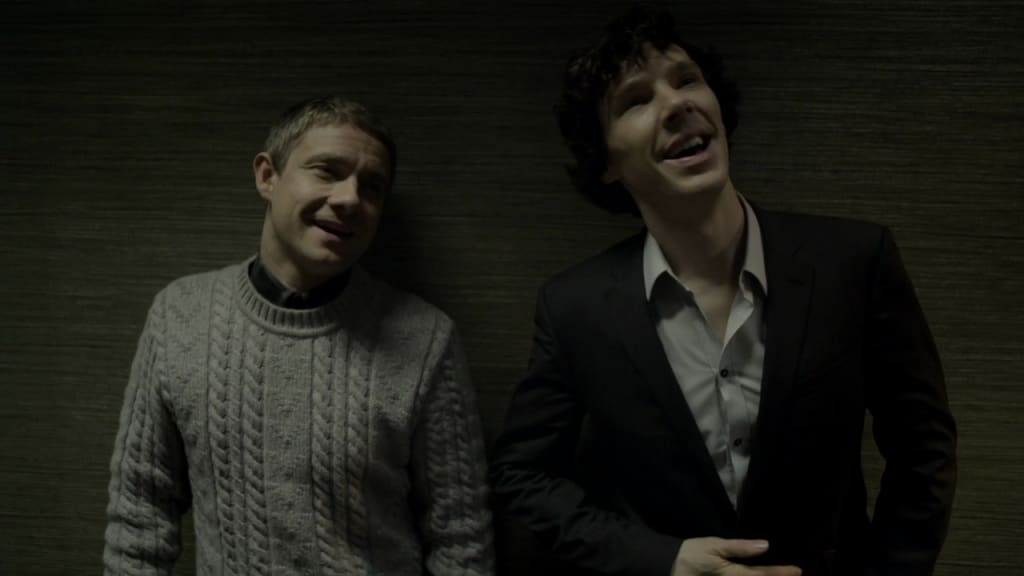
“The game, Mrs. Hudson, is on!”
Benedict Cumberbatch’s Sherlock declared these words back in 2010, yet for now, at least, it seems that the BBC’s critically acclaimed series Sherlock has ended, with the titular detective and John Watson (#MartinFreeman) galloping off into the streets of London. The show has had a stellar run of thirteen episodes, regardless of how divisive it has become in latter installments.
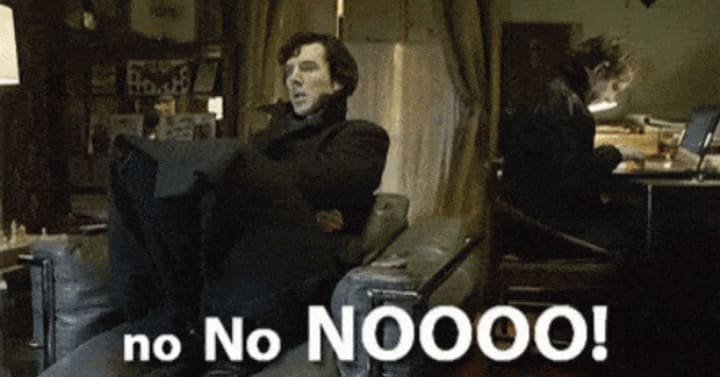
Sherlock is peeved, and not for the first or last time. [Credit: BBC]
But why are the specials so divisive? What makes some episodes of Sherlock great, whilst others fail to scale Sherlock's loftiest heights?
Read on to deduce which episodes of Sherlock are the worst, and best!
13. "The Six Thatchers"
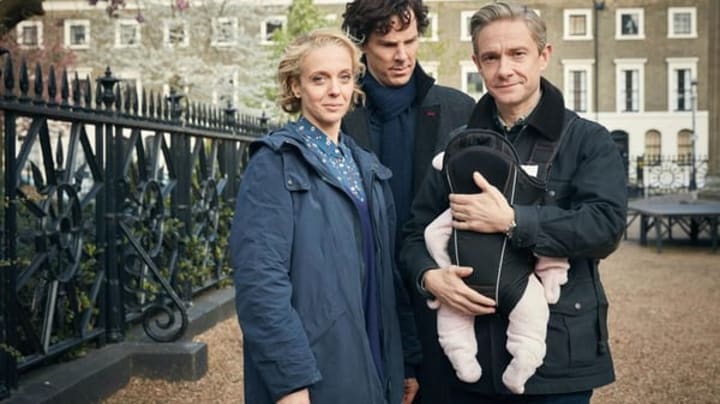
Sherlock struggles to comprehend his friends' parenthood [Credit: BBC]
Series 4: Episode 1
Synopsis: Sherlock and John investigate the suspicious death of a young man; however, they also uncover another mystery at the scene, involving smashed busts of Margaret Thatcher.
It’s a testament to the winning formula and quality of Sherlock that, even when it has its off-moments, it’s still a rollicking, enjoyable ride. However, "The Six Thatchers" does challenge this notion, and it will probably be seen as the show’s worst episode in the many years to come.
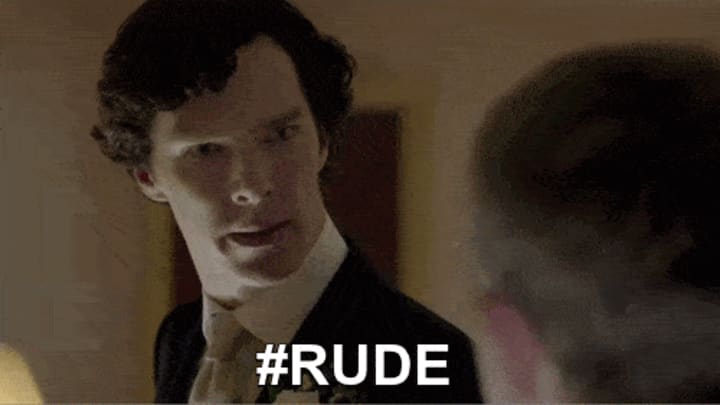
[Credit: BBC]
Indeed, after a shaky start where a loose plot thread from the previous series is awkwardly sidestepped, things seem to pick up for a short while before the episode descends into a very cluttered and convoluted tangle which errs on the tedious. It’s sad to admit to in a way, since "The Six Thatchers" sees Cumberbatch and co. remaining fabulously committed to their roles all the while.
12. "The Abominable Bride"
Series 3: Xmas Special
Synopsis: It’s the 19th century; Sherlock and John must combat a murderous bride who has seemingly risen from the grave.
Undoubtedly, interconnectivity and multiple story-lines can be great assets as the Marvel Cinematic Universe has shown. They can enhance the film or episode upon each re-watch, deepening the main plot, and open up so many more storytelling opportunities. However, if you cram an excessive amount of storylines into one film/episode, you risk derailing the main plot. Case in point: 'The Abominable Bride'.
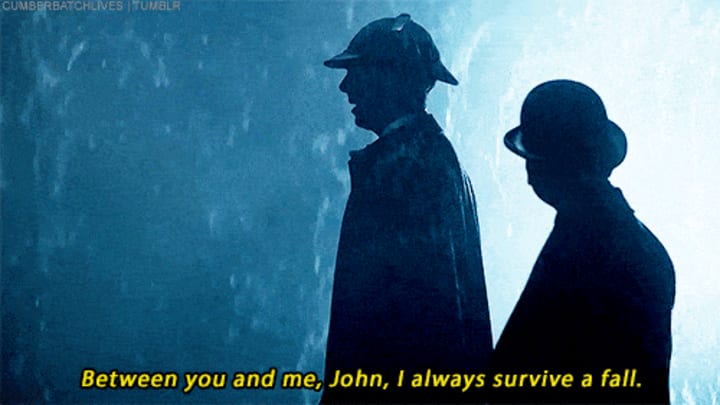
[Credit: BBC]
It's brilliant to see our modernized characters back in their original time-setting, but the episode moves so swiftly that it doesn’t allow you to savor the novelty. Witty and award-winning it may be, but the way in which the special is connected to the rest of the show makes it ultimately feel rather inconsequential. Just commit to the Victorian shenanigans, for pity’s sake!
11. "The Empty Hearse"
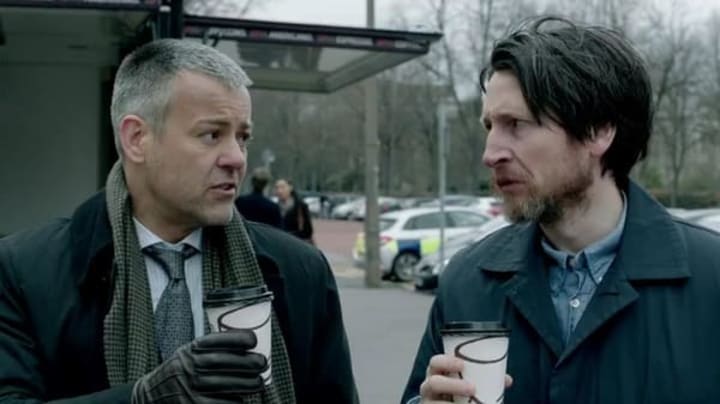
Anderson struggles to come to terms with Sherlock's suicide [Credit: BBC]
Series 3: Episode 1
Synopsis: Two years after the Reichenbach Fall, John has met Mary Morstan (Amanda Abbingdon) and is moving on with his life. That is, until Sherlock returns, and thrusts him into a battle with an underground terrorist cell in London.
"The Empty Hearse" is by no means a terrible episode of Sherlock, but let’s face it: aside from Sherlock’s unveiling in the restaurant and his subsequent reconciliation with John, it isn’t all that memorable. Then again, following up the critically-lauded "The Reichenbach Fall" was never going to be an easy task.
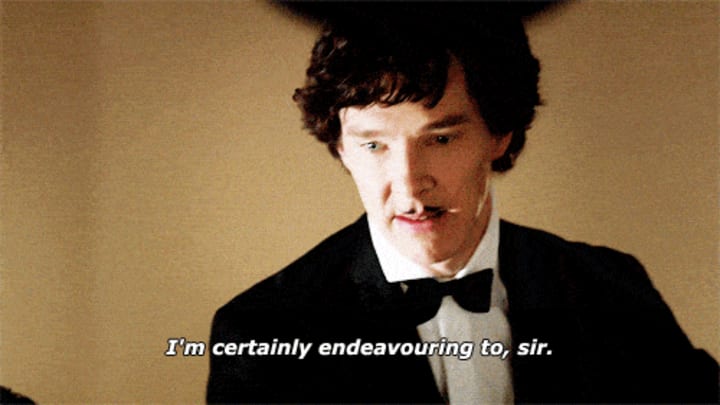
[Credit: BBC]
Fans have since marked this episode as the moment where Sherlock became aware of its own success. The episode even included a small club of "Sherlockians" speculating upon how he survived, which drew a mixed response from their real-life counterparts. And yeah, Sherlock’s prank on John on the train is a bit too much of a dick move, even for him.
Series 1: Episode 2
Synopsis: Hired by an old friend, Sherlock is hired to scrutinize the apparent suicide of a banker, but he is soon faced with a series of strange symbols, deadly assassins and a shadowy organisation.
Even when Sherlock’s plots don’t ignite, its trademark bickering between the leads remains on hand to keep the flame of interest alight. As John settles into his life with Sherlock, there are some sweetly relatable moments from him in this episode, such as his famous argument with a self-service machine (we’ve all been there) and his awkward attempts at cultivating a love life.
Yes, there’s still a lot of fun to be had with "The Blind Banker"- even with its somewhat dubious orientalist stereotypes- but like "The Empty Hearse", it fails to reach the heights of the rest of the show.
9. "His Last Vow"
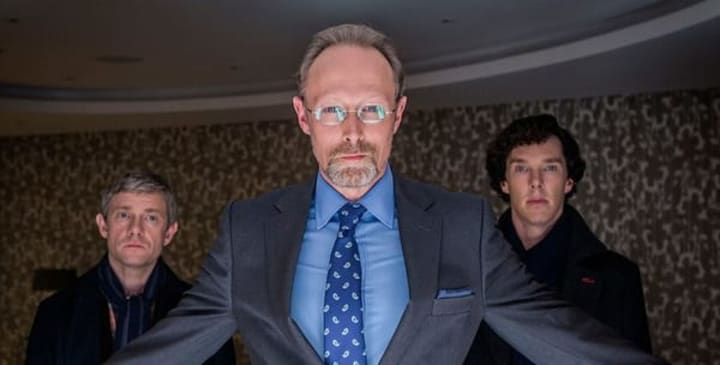
Sherlock and John confront Magnussen [Credit: BBC]
Series 3: Episode 3
Synopsis: John and Mary briefly settle into married life, before Sherlock recruits them to bring down media mogul and “Napoleon of Blackmail” Charles Augustus Magnussen (Lars Mikkelsen).
The third series of Sherlock gets some stick for becoming a little bit smug and self-aware, but its critics do tend to overlook some great parts about the show in this period, particularly in this episode. Mikkelsen's Magnussen is a steely and slimy villain; he may be nothing like the garrulous Moriarty, but he is still just as effective...and horrible!
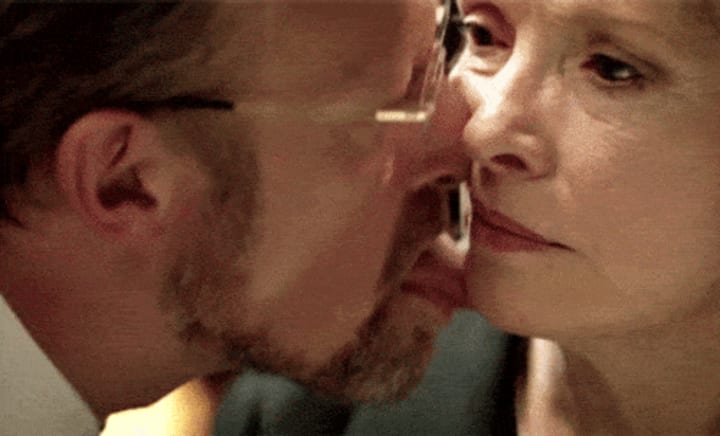
Um...ew...[Credit: BBC]
Plus the fantastically realized midsection in the Mind Palace provides us with some of the best visuals and deftest writing that the show has to offer. So why so low on the list you ask? Sadly, for all its effectiveness, these sections of brilliance never seem to coalesce as much as they should somehow, and though "His Last Vow" doesn’t necessarily suffer, it simply doesn’t soar as high as its fellows.
8. "The Final Problem"

Sherlock surveys the grim scene before him. [Credit: BBC]
Series 4: Episode 3
Synopsis: The East Wind has finally come for Sherlock, Mycroft and John, but will they all survive?
For a show concerned with thieves, sociopaths and murderers, this is surely one of the most harrowing and tense of all its episodes, featuring a riveting performance from Sian Brooke. Strikingly shot and almost monochromatic at some points, it may not be the show’s definite end necessarily, but a sense of finality definitely hangs over the proceedings, which means that this installment of Sherlock doesn’t have the sort of usual sparkle. However, the return of one particular character adds a dash of humor to the situation, and with a lovely time-lapse to round us off, the show ends on a rather lovely high after all.
7. "The Lying Detective"
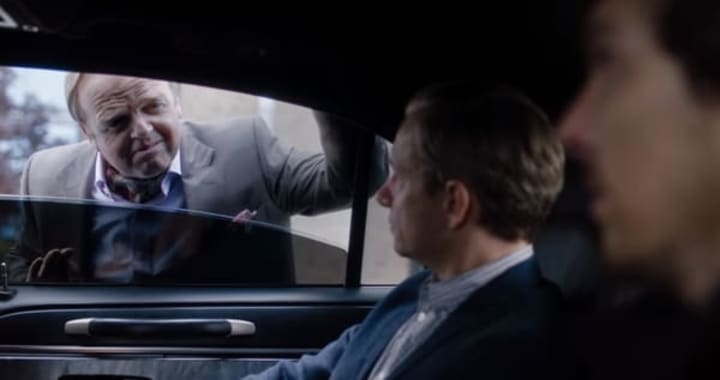
Culverton Smith draws near to our heroes. [Credit: BBC]
Series 4: Episode 2
Synopsis: A drugged-up and dying Sherlock is pitted against a celebrity (Toby Jones), whom he suspects of being a serial killer.
Many fans have seen this episode as an antidote to the bad taste left by "The Six Thatchers," and it’s not hard to see why. Though the episode doesn’t dispense with the kind of non-linear structure that has defined the more recent series, it’s a more confident and self-assured affair, which is afforded a firm anchor in its strong villain.
With his similarities to recent controversial celebrities, Culverton Smith is without a doubt one of the best-and certainly the most repulsive- of Sherlock’s adversaries, all thanks to a standout performance by Toby Jones. The awesome Mrs Hudson (Una Stubbs, having a ball) also gets a giddy moment or two to shine.
Series 2: Episode 2
Synopsis: The Baker Street Boys travel to Dartmoor, to help a man (Russell Tovey) who is traumatized by the death of his father. But they are also stalked by a monstrous creature.
As we approach the top 5, it’s now getting very difficult to pick apart these simply excellent episodes, whose positions are fairly interchangeable. However, not everyone can be a winner, and so we come to "The Hounds of Baskerville." The CGI might be a little iffy, and it may run out of steam midway when Sherlock and John have their fireside tiff, but it’s still a success.
Indeed, transferring the Gothic-based terror of the original novel to the perils of genetic engineering and military science is an inspired move on writer Mark Gatiss’s behalf. It’s as stylish and suspenseful as any of these other Holmes adventures, but its spookiness sets it apart from the others.
5. "A Study in Pink"
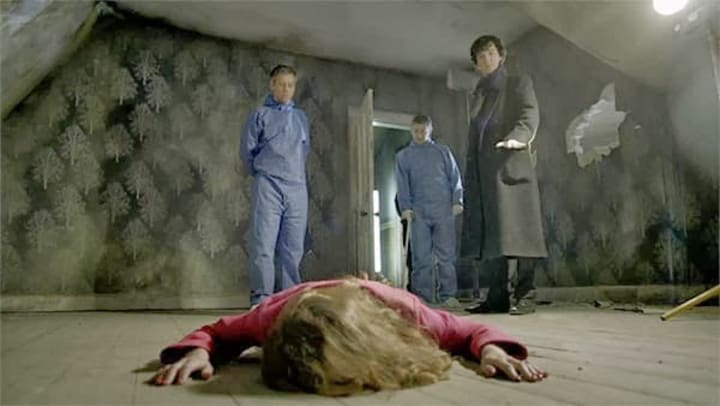
The titular lady in pink. [Credit: BBC]
Series 1: Episode 1
Synopsis: Returning from Afghanistan, John Watson struggles to re-adapt to civilian life. After a fatefully meeting a certain consulting detective, the pair bond over their examinations of a series or pill-induced suicides...or are they murders?
"A Study in Pink?' At number five? Surely not!" Well, just because it’s slightly lower on this list, does not mean that it’s terrible by any means.
In fact, as a series opener it’s a barnstormer, and it’s remarkably complete with nearly everything that made the series such a success, from the flashing text onscreen, to the slick writing and the fully-formed charisma of #BenedictCumberbatch’s Sherlock. The ingredients are all there for the greatness that would grace our screens soon enough.
Series 1: Episode 3
Synopsis: A criminal mastermind strikes from the shadows, pushing Sherlock and John into a series of increasingly challenging cases, culminating in a poolside showdown.
Yup, it’s the first Moriarty episode! "The Great Game" sees the first instance of multiple-mysteries featuring in a single episode. Though towards the end it might feel disjointed, it’s one of the strongest examples of Sherlock's narrative juggling act by far, and Gatiss even manages to throw in some great character moments and development in there for good measure.
And then there’s Andrew Scott’s career-making turn, as the deliciously diabolical Moriarty. Those final scenes crackle from the intensity of the show’s leads, as they relay those instantly memorable lines…flawless stuff!
3. "The Sign of Three"
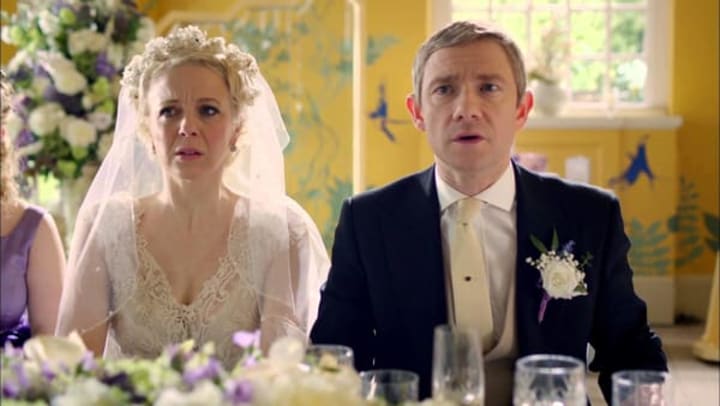
John and Mary watch as Sherlock quickly derails their wedding day [Credit: BBC]
Series 3: Episode 2
Synopsis: It might be John and Mary’s wedding day, but Sherlock still has to work hard to stop the mysterious Mayfly Man from murdering one of the guests.
This is sure to be a controversial entry this high on the list, in the eyes of some fans at least. Many see it as a scattershot and sickly sweet part of the show, but these criticisms do it a very great disservice. "The Sign of Three"s non-linear narrative is deftly handled and nowhere near as unwieldy as later episodes. Plus, let’s face it, it’s heartwarming and outright hilarious.
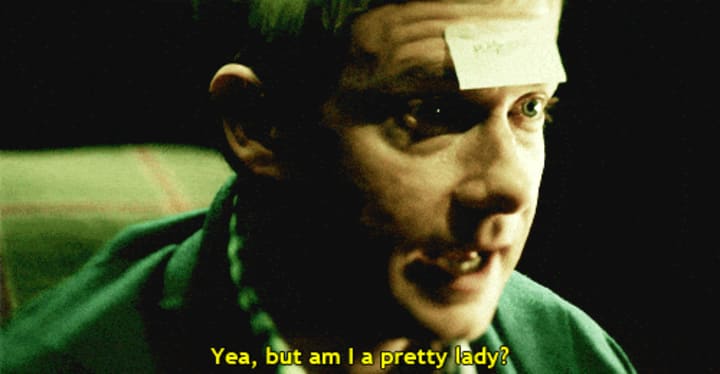
[Credit: BBC]
The chemistry between Freeman and Cumberbatch ensures that the stag-night scenes remain deliriously entertaining (coupled with a dub-step remix of the show’s theme), and let’s not forget Sherlock’s sublime speech, which is surely one of the best wedding day sequences in television history.
Series 2: Episode 1
Synopsis: Hired to retrieve compromising photos of a minor royal, Sherlock and John go toe to toe with the brilliant and wily dominatrix Irene Adler (Lara Pulver).
Several Sherlock episodes have tried to resolve the issues of their predecessors, but none have done it on such a skillful level as "A Scandal in Belgravia." Unexpectedly resolving that nail-biting cliffhanger with a brilliant bit of humor, we’re thrown back into the thick of it as Sherlock meets with Pulver’s icy and compelling Irene Adler.
Some of the show’s best writing and acting are on show here; every character gets a nuanced look-in, and the whole affair chugs along like a well-oiled, sophisticated machine. And it’s worth mentioning that the score for this episode is outstanding as well.
Series 2: Episode 3
Synopsis: Moriarty declares all-out war on Baker Street, putting Sherlock and John through a trying gauntlet in the ultimate battle of wits.
There’s very little to say about this episode that hasn’t already been said. Cunningly crafted and expertly realized, "The Reichenbach Fall" took the show to critically- and in Sherlock’s case, physically - dizzying heights. Its commentary on the media and celebrity culture is still very pertinent today, and as the situation intensifies, twisting and turning the episode never losing sight of where it’s heading.
Indeed, that exceptionally powerful conclusion had everyone talking about it for months on end- and lest we forget just how underrated #MartinFreeman was prior to that heart-breaking graveyard scene where everyone noticed his talents. This is one for the ages.
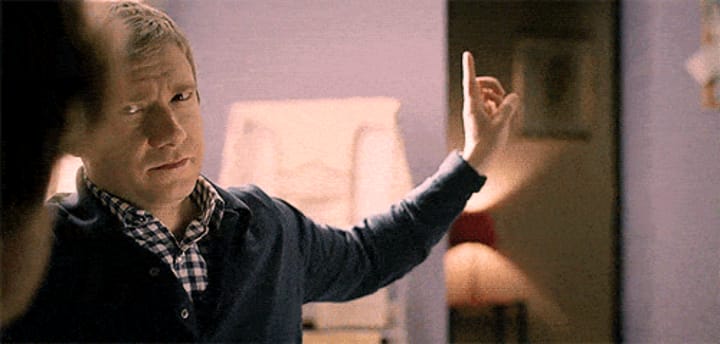
[Credit: BBC]
And so, that concludes the breakdown of the best and worst Sherlock episodes. If this truly is the end, then, as we have witnessed through this article, #StevenMoffat and #MarkGatiss have still left us with an acclaimed catalog of certified hits. But how do you feel about these rankings? Do you feel that they are in the wrong order?
About the Creator
Max Farrow
A fanatical film-watcher, hill-walker, aspiring author, freelance writer and biscuit connoisseur.
These articles first appeared on Movie Pilot between Jan 2016 and Dec 2017. Follow me on Twitter @Farrow91




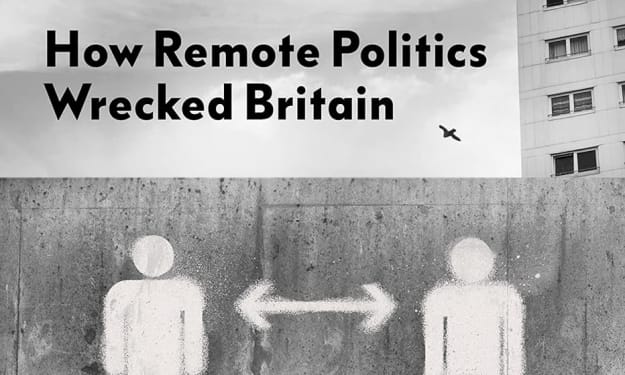

Comments
There are no comments for this story
Be the first to respond and start the conversation.